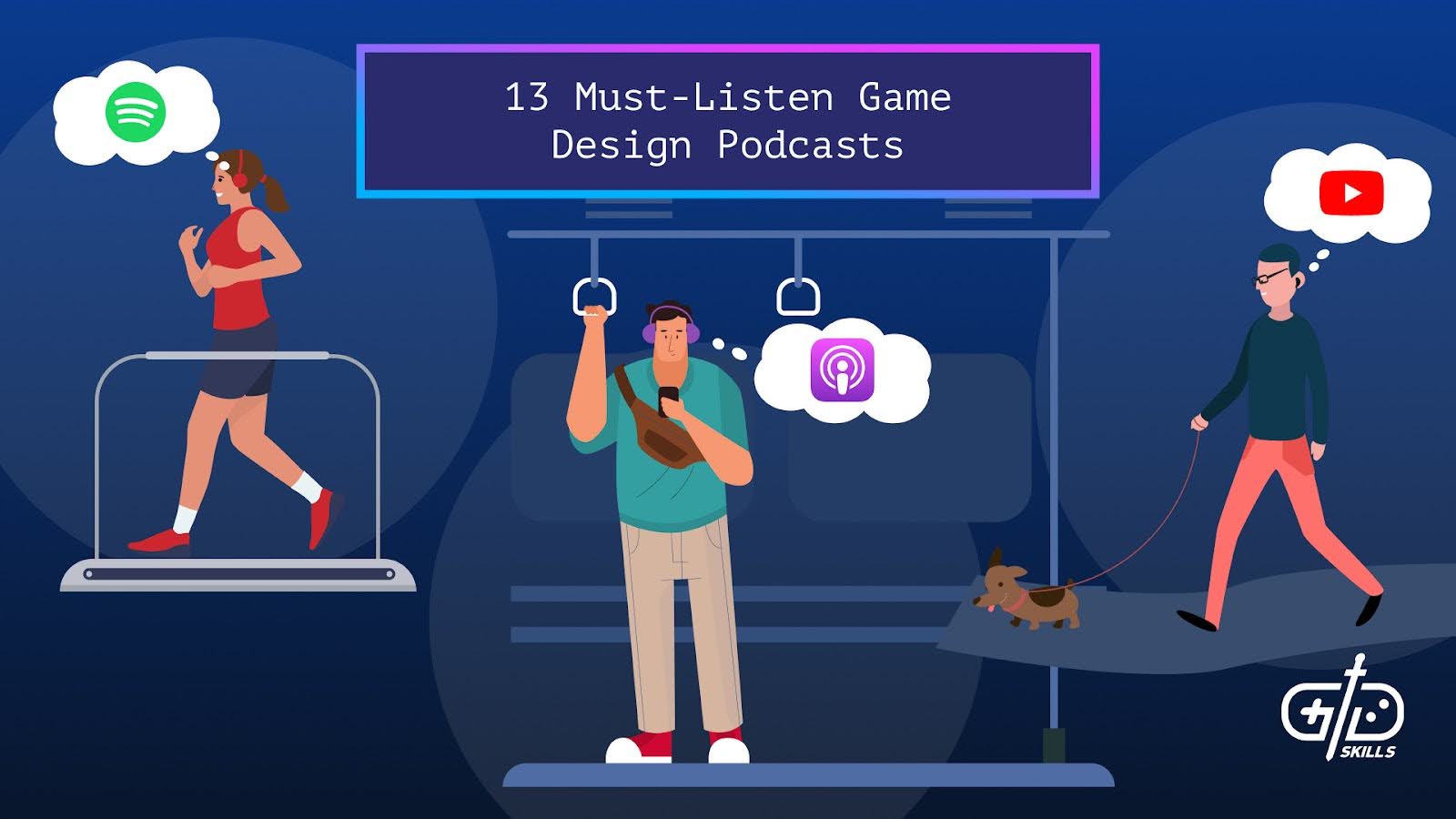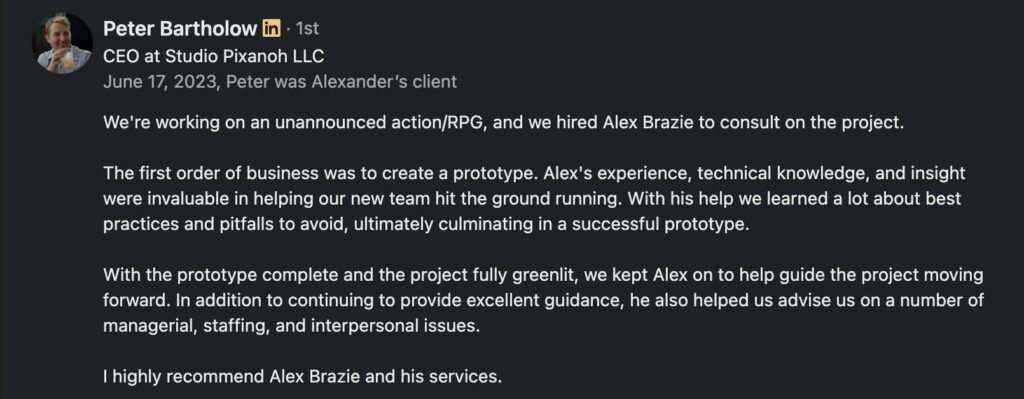Game design podcasts are a learning opportunity for junior or aspiring designers who want to level up their skills or enter the video game industry. Game podcasts refine decades of experience from professional game designers into blocks of free, hour-long weekly, biweekly, or monthly sessions, many with large listener counts.
Game design is a creative field backed by technical skills and realized through the cooperation of business interests and effective marketing. Games that succeed do so due to a mix of quality art, writing, programming, and business sense. Find game design podcasts to explore every aspect of the creative and collaborative process behind designing, developing, marketing, and releasing video games. Below are thirteen of the best game design podcasts on the Internet and why they’re worth listening to.
1. Funsmith Fireside Chats – by Game Design Skills
Funsmith Fireside Chats is a podcast that inspires up-and-coming designers with experience-based insights from game development industry pros. Each podcast episode is a discussion with a designer, producer, artist, QA tester, entrepreneur, or other game industry insider. Funsmith Fireside Chats interviews touch on topics like game design aesthetics, narrative, mechanics, art, roleplaying games, the game development workflow, and game design expertise in.

Funsmith Fireside Chats began in 2021 and has released 13 episodes. The podcast has included guests like Brian Feeny from Riot Games, Peet Cooper (artist on WoW, LoL, CoD, Diablo), Candace Thomas (Principal Game Designer at Riot Games), and many more game industry veterans. Game development practice doesn’t have a single set of guiding principles or a roadmap. With game development technology constantly evolving, podcast series like Funsmith Fireside Chats help veteran and aspiring designers stay in the loop.
2. The Game Design Round Table
The Game Design Round Table is a podcast designed to inspire digital, tabletop, and role-playing game designers by hosting discussions on design principles and industry trends. Hosts Dirk Knemeyer and David V. Heron, and their panel of guests, share insights on the game development industry, game mechanics, game design aesthetics, and game development workflow.

The Game Design Round Table began in 2012 and has over 340 episodes. Its list of guests includes Soren Johnson (lead designer on Civilization IV and host of a podcast mentioned later), Mark Rosewater (lead designer on Magic: The Gathering), and Emily Grace Buck (Creative Director at Buckshot Interactive). Game design balance is a frequent topic of discussion in The Game Design Round Table podcast. Insights from pros across tabletop, digital, and interactive fiction make it a compelling listen for aspiring and veteran game designers.
3. The AIAS Game Maker’s Notebook
The AIAS Game Maker’s Notebook is a podcast produced by the Academy of Interactive Arts & Sciences (AIAS) that explores one-on-one conversations with veteran figures in the video game industry. The AIAS Game Maker’s Notebook series is hosted by Ted Price (founder and CEO of Insomniac Games) and covers the business and craft of interactive media. The one-on-one format means the podcast offers thoughtful and intimate perspectives from a diverse range of people across the gaming industry.
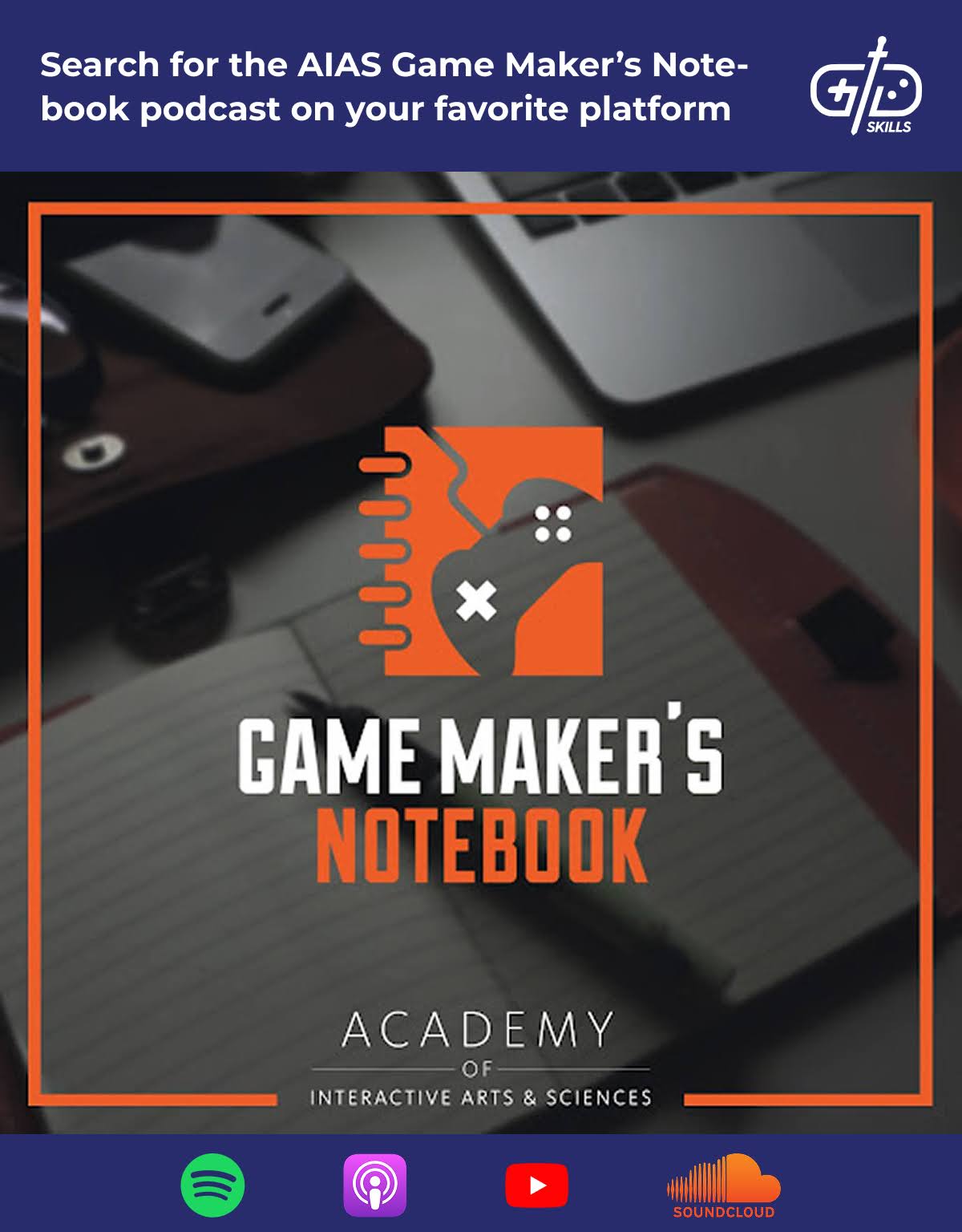
The AIAS Game Maker’s Notebook launched in 2017 and has over 280 episodes. The podcast’s interview series has hosted guests such as Troy Baker (acclaimed voice actor), Rebecca Ford (Creative Director at Digital Extremes), and Alexey Pajitnov (creator of Tetris). Game makers at all stages of their careers will find compelling insights as Ted Price and his guests discuss games according to the D.I.C.E. principle – Design, Innovate, Communicate, Entertain.
4. Game Dev Unchained
Game Dev Unchained is a video game podcast that aims to counter the don’t ask, don’t tell culture that exists in some parts of the video game industry. Unlike more game design-specific podcasts, Game Dev Unchained covers topics like career transition, personal growth, and offers industry insights from veterans and newcomers. The podcast host, Brandon Pha,m discusses these topics with game developers from all walks of life and every corner of the game dev industry.
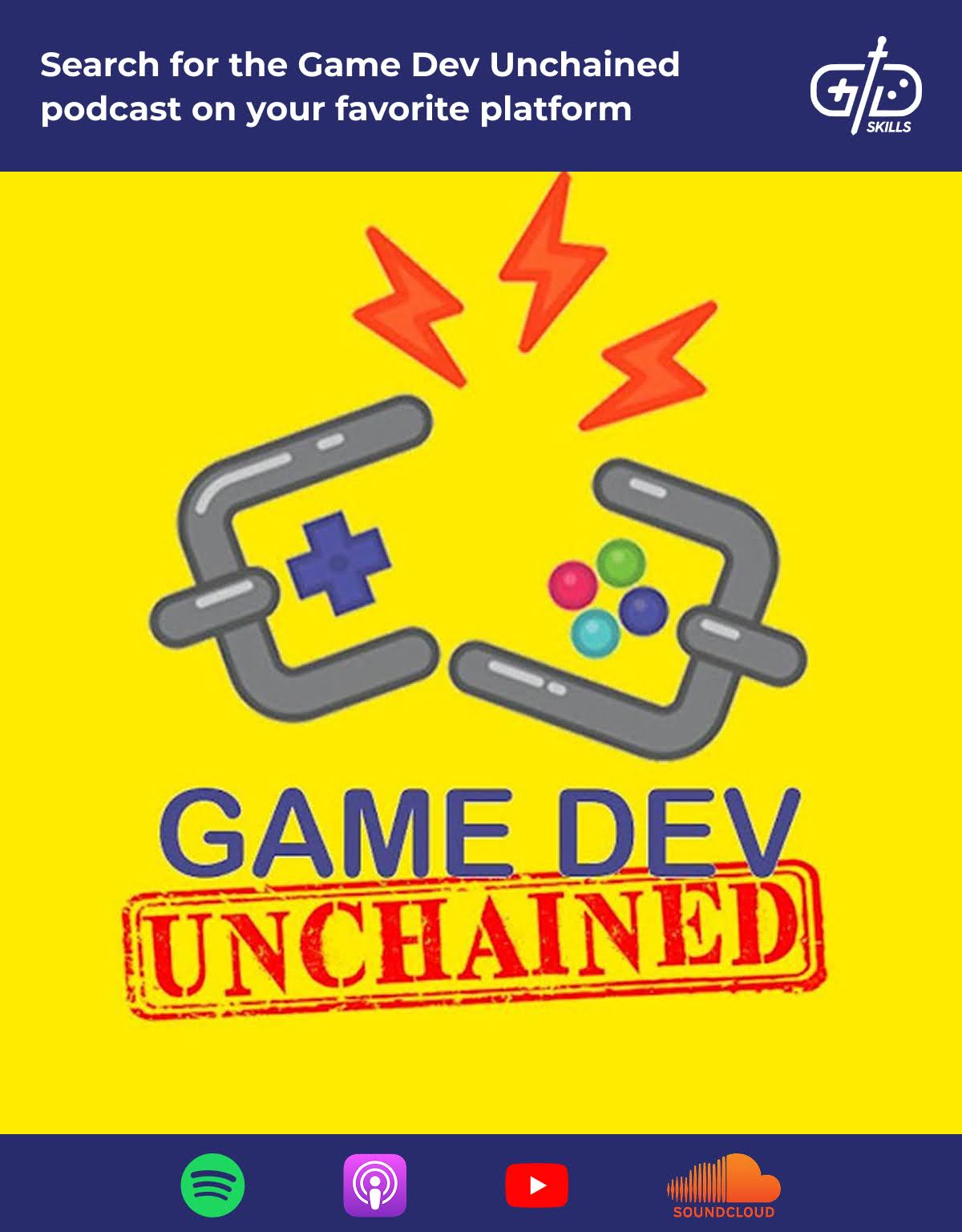
Game Dev Unchained started in 2015 and has released over 400 episodes. Its list of guests includes Chella Ramanan (narrative designer at Ubisoft Massive Entertainment), Alex Silkin (Co-founder and CTO of Survios, and Chris Stone (veteran AAA Studio General Manager). Each Game Dev Unchained episode covers a different aspect of game development. The podcast is notable for its broad range of topics, including narrative design, workplace culture, diversity, engineering, and more.
5. The Game Developers Radio
The Game Developers Radio is a game dev podcast focused on topics like industry trends, game design, community management, and in-depth analysis of specific events and game genres. The podcast hosts Joseph Burchett and Bernard DeCrane present the podcast alone but occasionally use an interview format to gain insights from podcast guests.
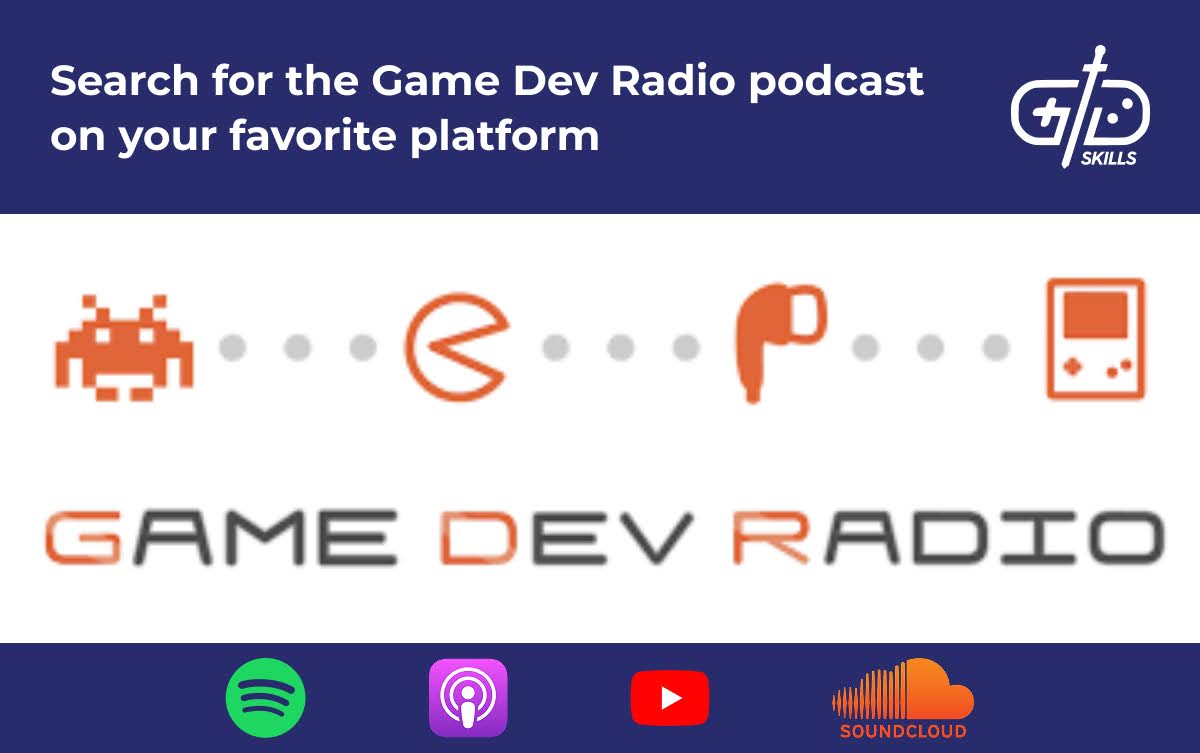
The Game Developers Radio podcast started in 2012 and has released approximately 80 episodes. One notable Game Developers Radio expert guest is Amanda Foster (a graphic/UI designer for the card game Dead End Block). The podcast hasn’t released new episodes since 2018, but its archive remains a valuable resource for game devs of all types.
6. Coffee with Butterscotch: A Game Dev Comedy Podcast
Coffee with Butterscotch is the podcast of award-winning indie game studio Butterscotch Shenanigans, best known for the Crashlands series. The Coffee with Butterscotch podcast focuses on comedy and humor in games and gaming culture. Podcast hosts, Seth, Sam, and Adam Coster, discuss their experiences in game dev, entrepreneurship, and life.
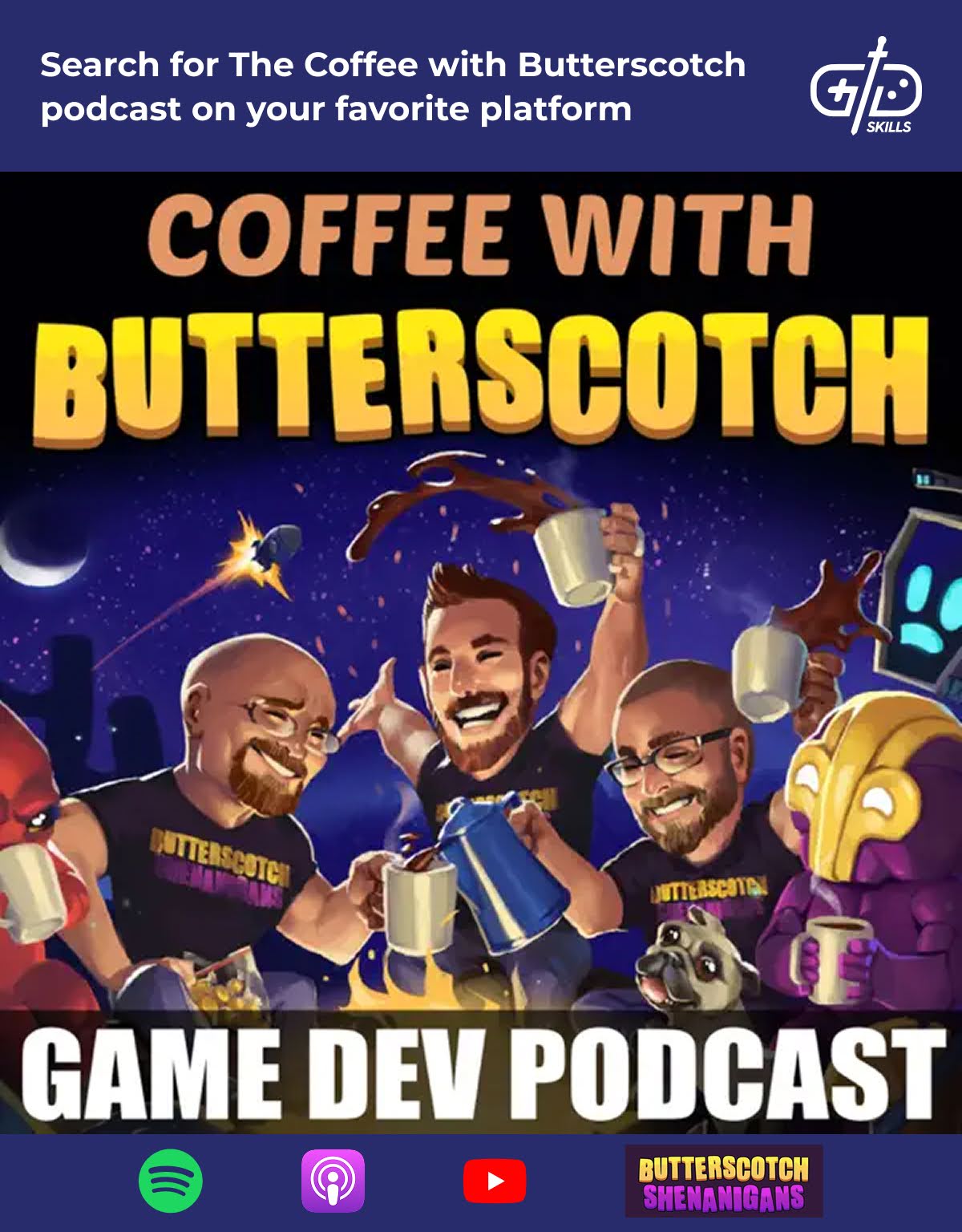
Coffee with Butterscotch has been running since 2015 and has over 500 archived episodes. The podcast doesn’t feature regular guests as the three Coster brothers are enough to run each episode’s topic through their recognizable Butterscotch Shenanigans humor. Game Dev Comedy Podcast topics include game design, personal anecdotes, studio culture, and behind-the-scenes looks at their upcoming game, Crashlands 2.
7. Think Like A Game Designer
Think Like A Game Designer is a podcast featuring in-depth discussions with top game designers and creative experts from other fields. Podcast host Justin Gary (CEO of Stoneblade Entertainment) and his guests discuss topics like level design, offer game design insights, and deep dive into the complex cultural, technological, and business factors that influence video game production.
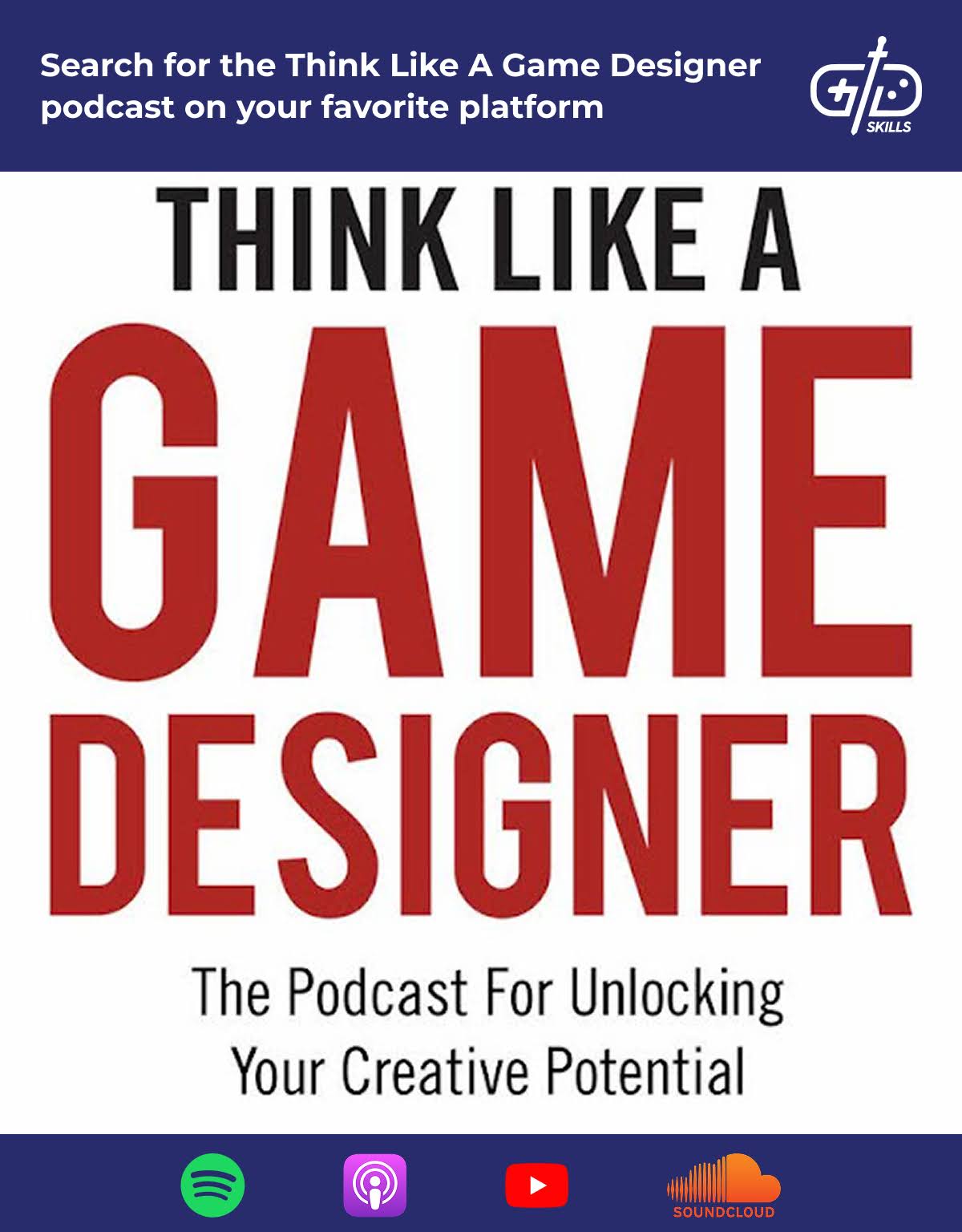
Think Like A Game Designer launched in 2019 with over 90 episodes in its archive. The podcast’s list of guests includes Jonathan Tweet (co-designer of Dungeons & Dragons 3rd Edition), Ben Brode (former game director of Hearthstone), and Soren Johnson (lead designer on Civilization IV and founder of Mohawk Games.) Its broad range of topics, deep analysis of game mechanics, and deconstruction of the creative process make Think Like A Game Designer a valuable resource for game designers of all kinds.
8. Game Dev Advice: The Game Developer’s Podcast
Game Dev Advice is a podcast featuring interviews with game designers, programmers, producers, artists, and CEOs, breaking down their processes and offering meaningful game dev advice. The podcast host John “JP” Podalesk is a 30-year veteran of the game industry, consulting on AAA, AA, and indie projects.
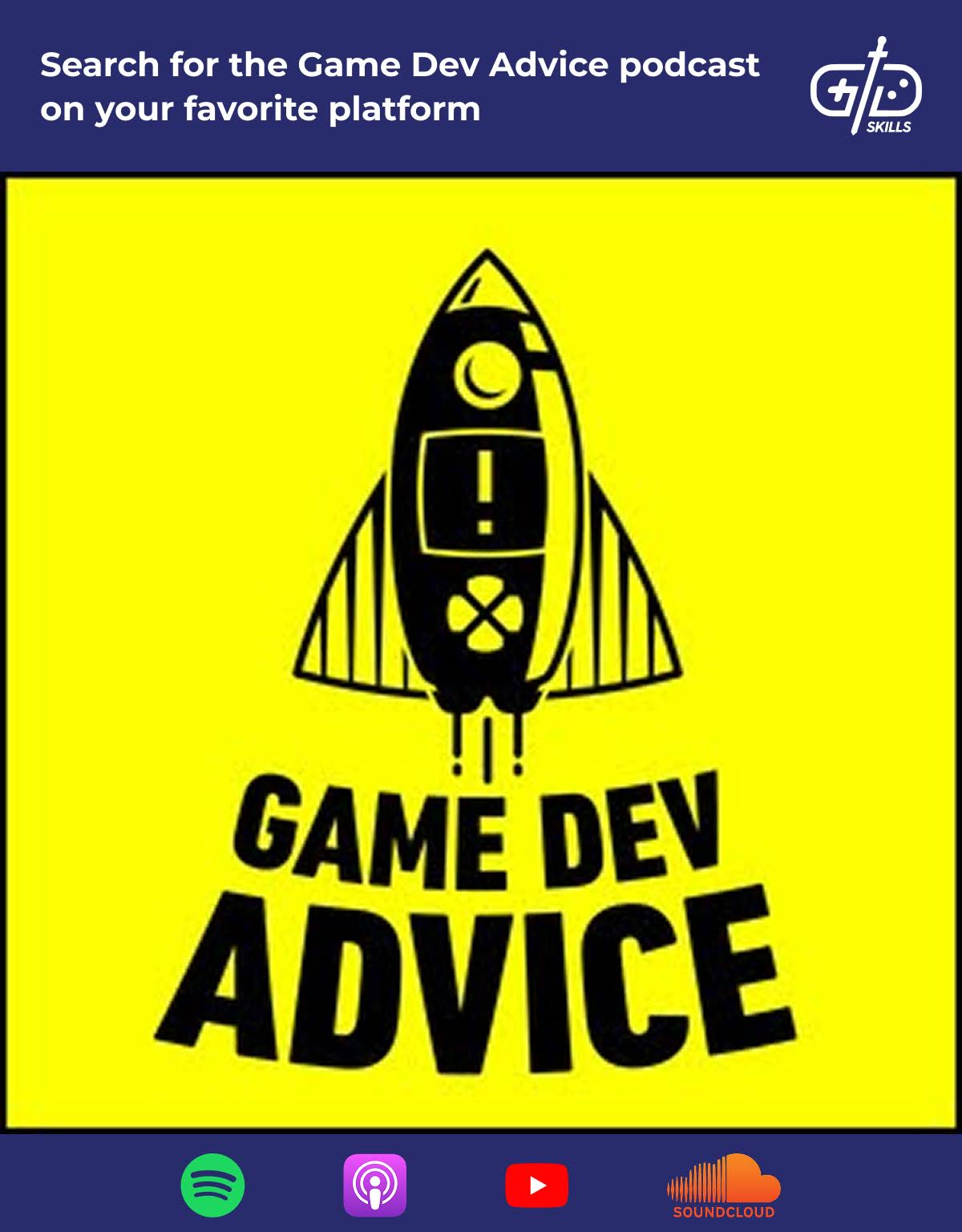
Game Dev Advice launched in 2019 and has a list of 72 episodes in its archive. Notable guests from the podcast include Alex Seropian (co-founder of Bungie), Jeri Ellsworth (CEO of Tilt Five), and Jurie Horneman (senior gameplay programmer on GTA Vice City). Game Dev Advice delivers on its name, offering valuable insights from world-class game developers in a no-nonsense format.
9. Humans Who Make Games with Adam Conover
Humans Who Make Games is a podcast that features in-depth interviews with video game developers, focusing on their personal journeys, creative processes, and the challenges they face in the gaming industry. The podcast host, Adam Conover, is a comedian, lifelong gamer, and cultural commentator. He brings a light touch to interviews that cover technical and creative design concepts.
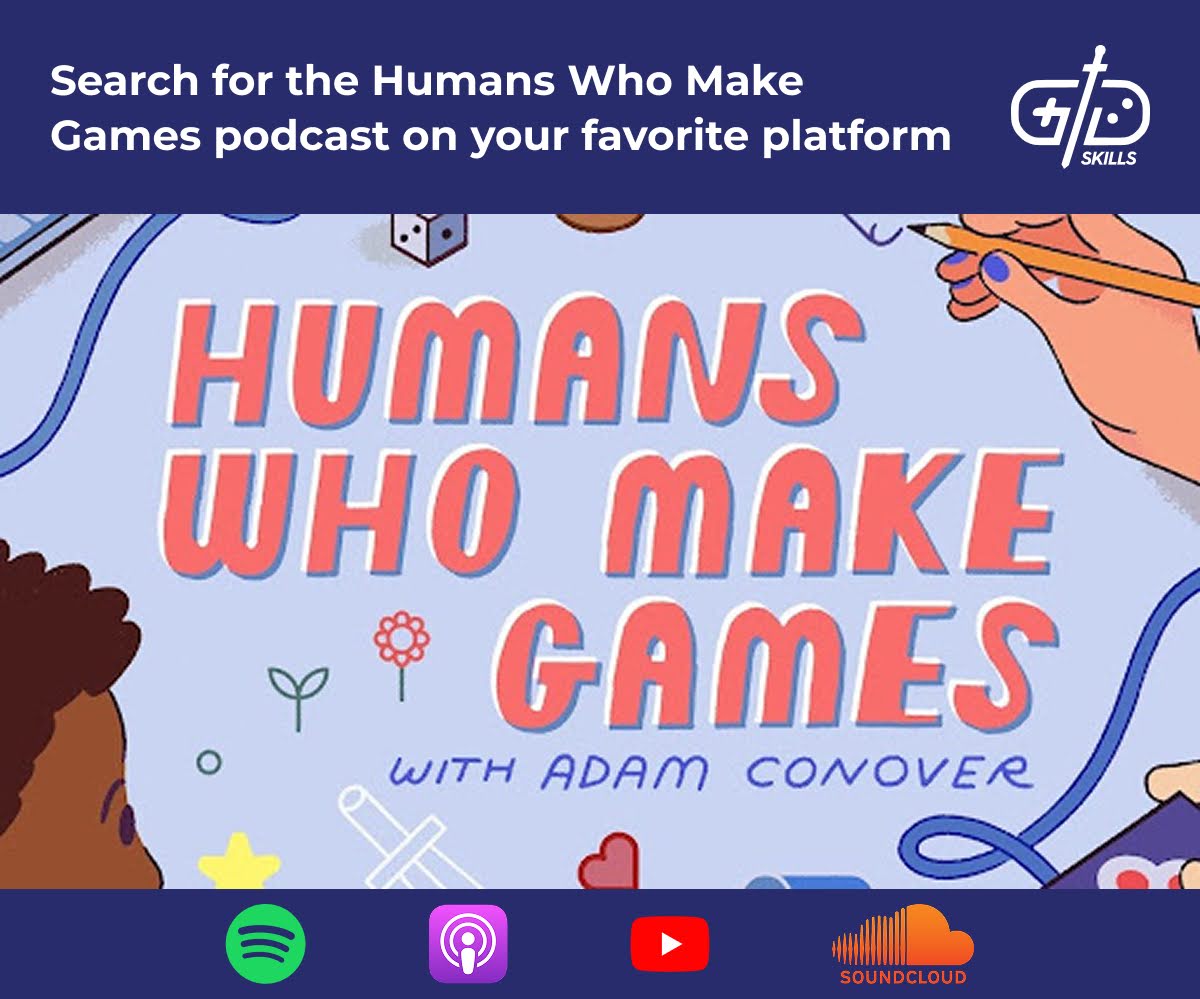
Humans Who Make Games launched in 2019 and has a library of 19 episodes. Guests that have appeared on the podcast include Kim Swift (Portal), Edmund McMillen (Super Meat Boy, The Binding of Isaac), and Alx Preston (Hyper Light Drifter). No new episodes of Humans Who Make Games have been released since May 13, 2020, but its archive remains a valuable resource for veteran and aspiring game designers.
10. Gamedev Loadout
Gamedev Loadout is a podcast covering game design, marketing, team management, and professional development. Gamedev Loadout’s host Tony Chan attracts experienced industry insiders from indie game devs to AAA devs to share their thoughts through interviews and website articles. The podcast host attract prominent guests through its significant Twitter engagement. The Gamedev Loadout YouTube channel and website offer resources and further insights into podcast topics.

Gamedev Loadout launched in 2017 and has built up a library of 99 episodes. Game developers who have appeared on the podcast include Vincent Michael (founder of YHWH Games), Mikolai Stroinski (composer on Witcher 3), and Kelly Wallick (founder of Indie Booth). GameDev Loadout stands out for its impressive roster of guests and diverse range of topics. Its YouTube channel tutorials follow through on some of the concepts brought up in the podcast episodes.
11. The Corner of Story and Game
The Corner of Story and Game is a podcast dedicated to analyzing the intersection of storytelling and game design. The podcast covers ideas like character development, emotional engagement, story mechanics, and player agency. It discusses narrative and game design across board games, tabletop RPGs, and video games.

The Corner of Story and Game launched in 2022 and has over 120 episodes in its archive. Guests who have appeared on the podcast include Emily Grace Buck (Creative Director at Buckshot Interactive) and Christie Golden (author and transmedia storyteller). The Corner of Story and Game stands out for its focus on narrative integration and the unique features of storytelling for video games.
12. HomeTeam GameDev Podcast
HomeTeam GameDev Podcast is a biweekly podcast focused on the experience of people working across all sectors of the game industry. It features interviews with everyone from professionals at AAA studios to indie developers and hobbyists, sharing their insights into the game industry. Host Chris DeLeon has been making games for 26 years, working with startups and AAA games, and has taught game creation at Georgia Tech.
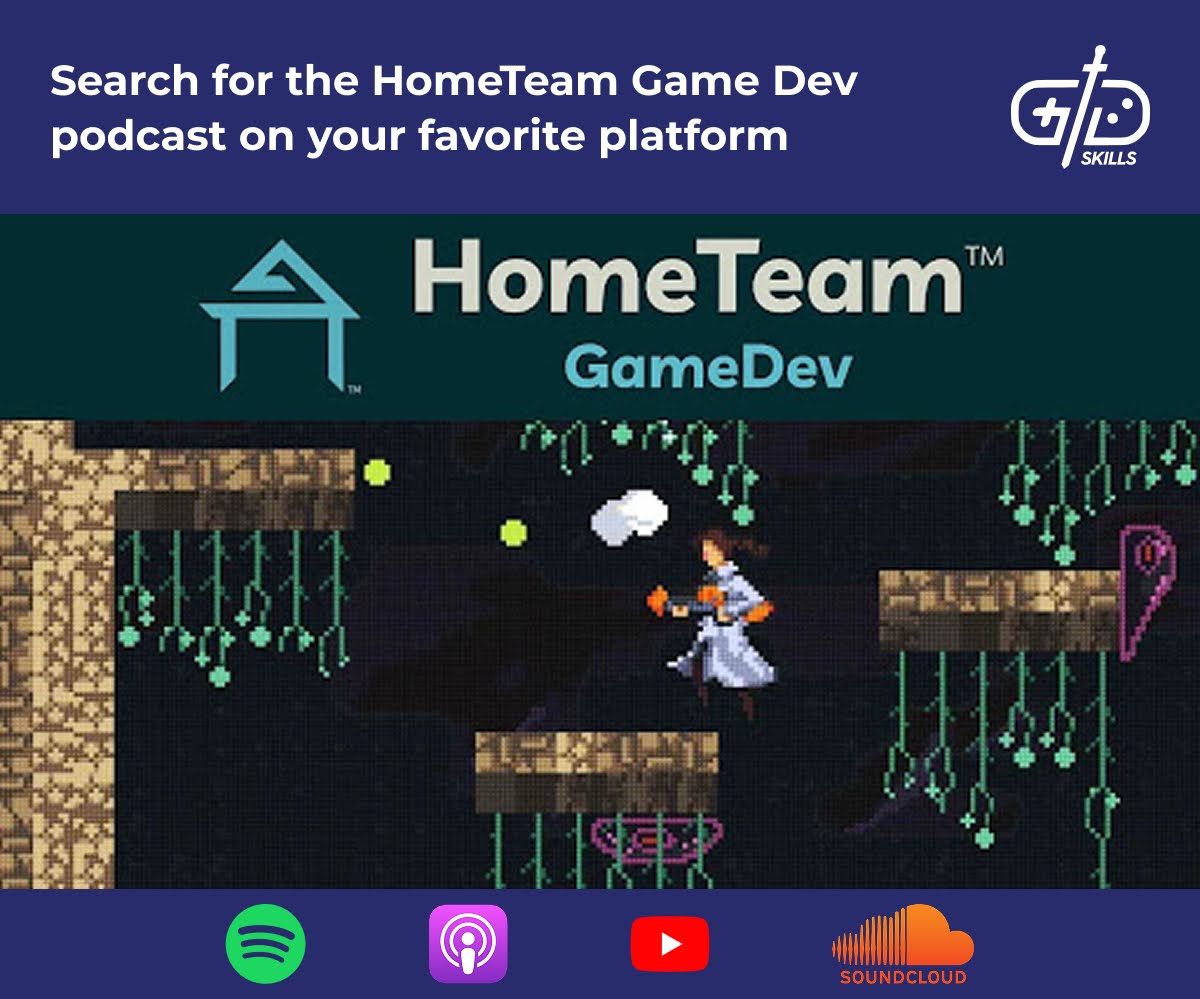
HomeTeam GameDev Podcast started in 2015 using the name Game Developers Like You. It was later rebranded as Gamkedo. Community, and adopted its current title, HomeTeam GameDev Podcast, in 2019. It features over 240 episodes in its archive. Notable guests on the podcast include Nic McConnell (Manager in Ratings at Riot Games), Megan Fox (founder of Glass Bottom Games), and Scott Anderson (Game developer at Unity).
13. Designer Notes by Soren Johnson
Designer Notes is a podcast that features in-depth interviews with noted game designers across many platforms and genres. Podcast host Soren Johnson was the lead designer on Civilization IV and is the founder of Mohawk Games. His wealth of experience and deep connections in the industry mean the caliber of guests and discussion is high.
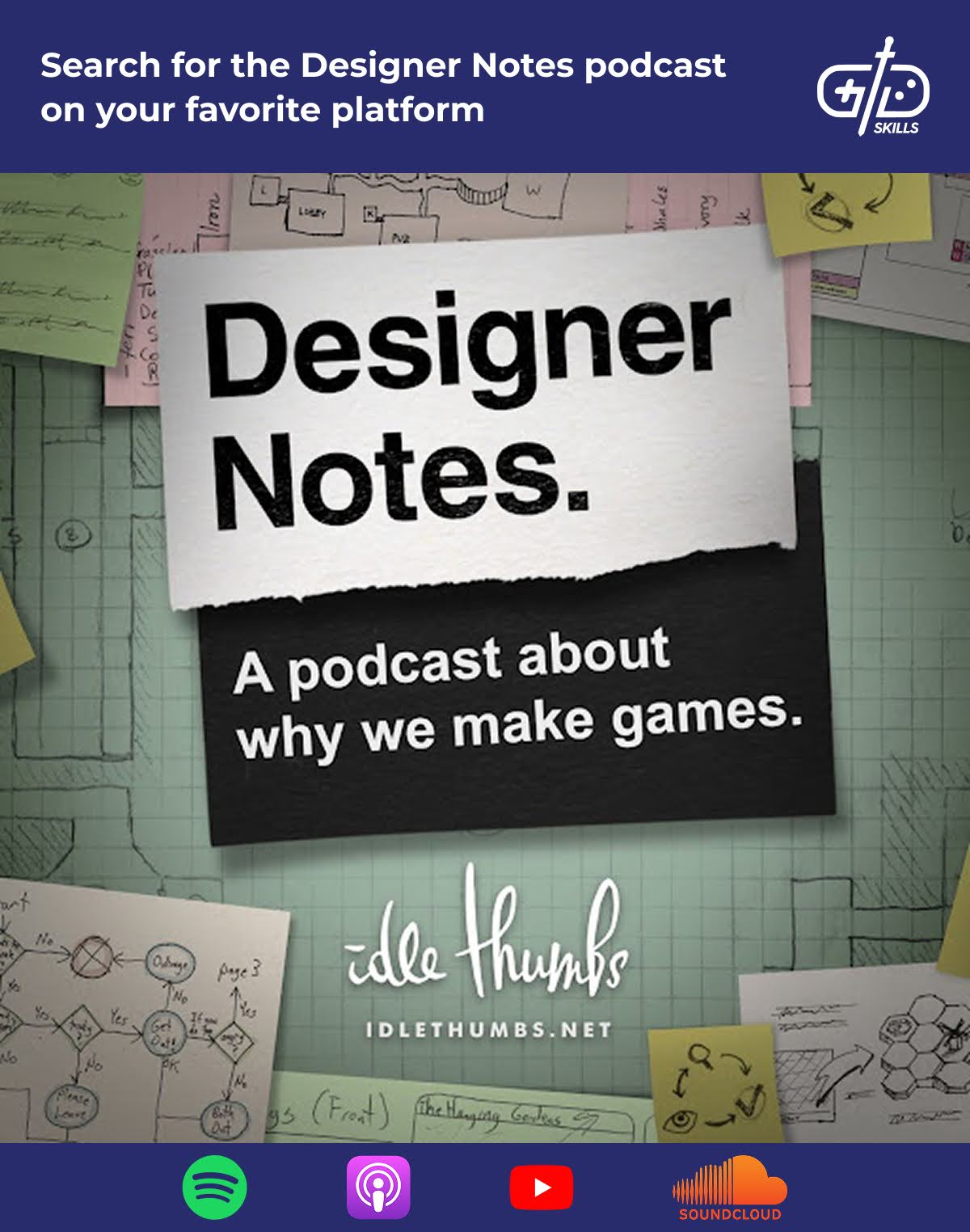
Designer Notes by Soren Johnson began in 2014 and has amassed a library of 86 episodes. Guests that have appeared on Designer Notes include Zach Barth (SpaceChem, Infinifactory), Jake Solomon (lead designer of XCOM Enemy Unknown), and Trent Kusters (co-founder of League of Geeks). Designer notes feature long-form interviews that often run over two hours, allowing the host and guest to get deep into their chosen topic.


